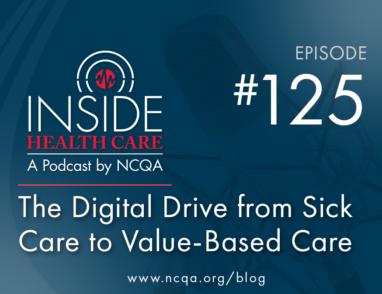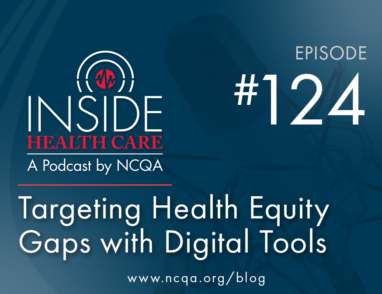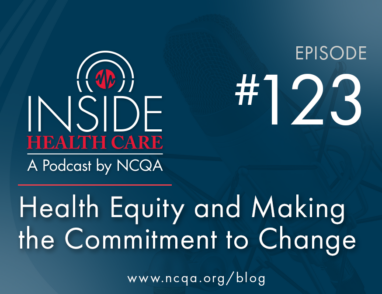Inside Health Care #119: Bringing Alcohol Screening to the PCPs & Coordinated Care through CBOs
November 22, 2023 · David J. Smolar
In this episode of Inside Health Care, we present two interviews that each ask really basic, yet complex, questions about health care.
The first question: Why are patient alcohol and substance use issues so often overlooked in primary care? This interview will not only answer that question: it will point patients and providers in the right direction: toward adoption of universal alcohol screening and follow-up. Three experts remind us that there is help to implement evidence-based alcohol health care—free resources from NCQA and the National Institute on Alcohol Abuse and Alcoholism [NIAAA], part of the National Institutes of Health [NIH].
At NCQA’s second annual Health Innovation Summit, we interviewed Dr. Thekla Brumder-Ross, Dr. Katharine Bradley and Dr. Laura Kwako.

Dr. Thekla Brumder-Ross
Dr. Thekla Brumder-Ross is a clinical psychologist and national leader of addiction medicine. In her 14 years at Kaiser Permanente, Thekla led and implemented large-scale practices and policies in addiction medicine, treatment protocols and primary care behavioral health integration. Notably, she led the addiction medicine leaders of operations and research across the Kaiser Permanente Enterprise, facilitated the spread of the “screening, intervention and referral to treatment” methodology known as “Alcohol as a Vital Sign” across eight Kaiser markets, and developed a national “harm reduction” strategy. Thekla currently provides strategic consultation to the NIAAA.

Dr. Laura Kwako
Dr. Laura Kwako is chief of the Treatment, Health Services, & Recovery Branch in the Division of Treatment and Recovery at the NIAAA. Her office supports research in broad categories, including behavioral health treatments, translational research and innovative methods and technologies across the continuum of care.
Her work also focuses on under-served populations, including NIH-designated health disparity populations, individuals with co-occurring disorders and fetal alcohol spectrum disorders. During her time at NIAAA, Laura has been involved in development of the Healthcare Professional’s Core Resource on Alcohol and the Addictions Neuro-clinical Assessment. She received her PhD in Clinical Psychology from Catholic University in Washington, DC.

Dr. Katharine Bradley
Dr. Katharine Bradley is a primary care general internist, and her research on unhealthy alcohol use and opioid use disorder has included developing trials of implementation of alcohol screening, brief interventions and shared decision making for alcohol use disorder across primary care clinics. She recently received NIAAA funding for the SIP trial, the full title of which is Systematic Implementation of Patient-Centered Care for Alcohol Use Trial: Beyond Referral to Treatment.
Drs. Brumder-Ross, Kwako and Bradley collectively strive to link substance use disorders and treatment to behavioral health, which they see as just one part of a “whole health” approach to clinical medicine. We discussed some amazing tools now available to incorporate screenings for alcohol or drug use into mainstream primary care assessments. And those tools, by the way, take advantage of NCQA HEDIS measures. But let’s hear it from them.
Some resources discussed in this interview:
- The NIAAA Alcohol Healthcare Roadmap: A simple workflow that plans and providers can adapt
- Health plans can adopt the NCQA HEDIS measure on Alcohol Screening and Follow Up – now publicly reportable, bringing potential financial incentives to health plans
- Implementation guides available in Core Additional Links
- NCQA resources for patient screening
- Free training from NIH: NIAAA’s Healthcare Professional’s Core Resource on Alcohol

Taylor Justice
The other question: Why is it so hard to develop a health care coordinator service for patients at the local level? It’s something most of us could use: a helper to walk with us through a health journey, advise us in a crisis and make sure we get all the tests and records we should have.
Taylor Justice is a U.S. Army veteran and co-founder of Unite Us. Unite Us provides end-to-end solutions that establish a new standard of care that identifies and predicts social care needs in communities, helps enroll people in services and leverages meaningful outcomes data to drive community investment. With services extending to at least 44 U.S. states, Unite Us creates accountable coordinated-care networks, interconnecting providers of social services to reduce the cost of care by integrating ALL social determinants of health.








